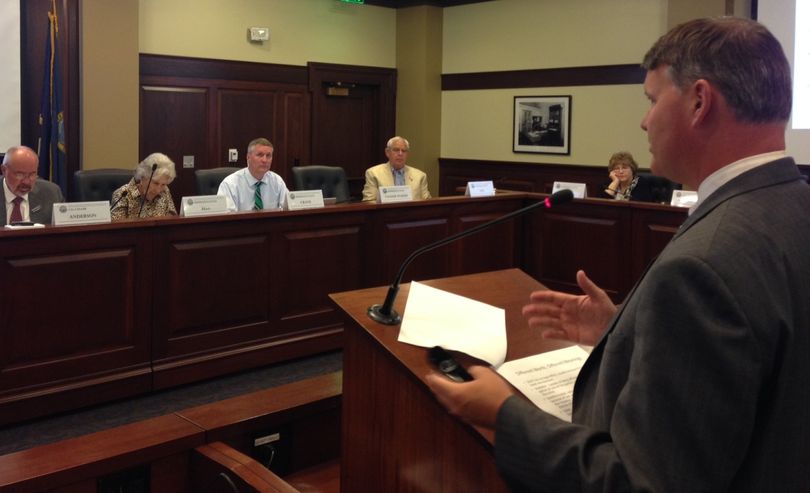With tens of millions at stake, IEN contract fallout focuses on the word ‘void’

The Idaho Attorney General’s office sent a demand for full repayment for all funds advanced under the court-voided Idaho Education Network contract to two vendors, CenturyLink Communications and Education Networks of America, on Aug. 10, after state Department of Administration Director Bob Geddes said he wouldn’t ask the firms for the money. That’s what prompted both companies to sue the state in federal court, charging that they provided services under the contract before it was overturned in court – and also charging that they’re still owed millions more for services rendered, for which the state hasn’t paid.
The problem: Idaho law bans payments under a void contract. Wasden’s Aug. 10 letter to the two vendors – you can read it here – notes that the Idaho Supreme Court ordered the state to seek repayment. “The Director of the Department of Administration has advised me that he does not intend to seek repayment under section 67-5725,” Wasden wrote. “Accordingly, the duty to do so falls to me. In deciding not to seek repayment, the Director of the Department of Administration apparently construed ‘money advanced’ under section 67-5725 to mean money paid before services were rendered. I understand that similar arguments were made to the Supreme Court in the Syringa case. The court did not appear to accept this narrow definition of ‘money advanced.’ Instead, it interpreted section 67-5725 to place a ‘mandatory’ duty on State officials to seek repayment.”
Therefore, he wrote, the state is demanding that ENA and CenturyLink “repay all funds they received from the State of Idaho” under the court-voided IEN contract.
No amount is listed in Wasden’s letter, but two vendors were paid nearly $30 million before the broadband network linking Idaho high schools went dark last year. Since then, Idaho schools have contracted for their own broadband services, at millions of dollars in savings compared to the IEN’s costs. The original IEN contract totaled $60 million.
It was challenged in court by Syringa Networks, an Idaho company that had bid on the contract in partnership with ENA, which is based in Nashville, Tenn. Qwest, now CenturyLink, based in Monroe, La., submitted a competing bid. The state Department of Administration, then under the direction of Mike Gwartney, Gov. Butch Otter’s best friend, awarded the contract to ENA and Qwest, cutting Syringa out. Syringa sued and won, with the Idaho Supreme Court issuing its final ruling in March.
Today, the Idaho Legislature’s interim committee on state procurement laws heard a briefing on “void contracts” from Deputy Attorney General Brian Kane. Senators and representatives on the panel expressed deep concerns about the implications of the current law, which Kane explained creates both a “sword and a shield” – a shield to protect taxpayers from spending money illegally, but a sword that could punish a vendor in certain situations, even if they performed services in good faith.
Sen. Fred Martin, R-Boise, said, “I agree that our responsibility is to the citizens of the state of Idaho whom we represent. But the way I interpret this as written now – void, money advanced, return forthwith – if I’m a vendor, my only recourse is to sue the state. To me, the state’s recourse is to say the contract’s void, we want our money back … even though we received something. So … we created, in my mind, a lawsuit, by the way this is set up.”
Kane responded, “I think that we’re actually seeing that scenario bear out right before our eyes.”
Wasden’s letter to ENA and CenturyLink demanding repayment of all funds asks for a response by today. “Absent a timely response and resolution of this demand, my office will file an action to have the Idaho courts resolve the issue,” he wrote.
ENA and CenturyLink beat Wasden to the punch, with both filing federal lawsuits against the state on Friday.
Some have suggested that Idaho should change one word in its procurement law, from “void” to “voidable.” A “void” contract means it’s like it never existed – no money could be paid under it. A “voidable” contract is one that could be invalidated at a certain point, without jeopardizing payments made before that point.
Under questioning by committee members, Kane said that would shift the balance. “You are changing that landscape for sure,” he said. “You want to make sure you aren’t creating a free pass ... to say ‘Oh, if we do this, it’s going to take three years to get into court, and by that time you’ll be completely paid and on down the road.’” He recommended adding definitions, not only to that term or its replacement, but also to “money advanced” and possibly other terms in the law.
Any changes that the committee recommends would be for the law in the future – they wouldn’t apply to the IEN case, which is proceeding under the current law. That law, now section 67-9213, says, “VOID CONTRACTS. All contracts made in violation of the provisions of this chapter shall be void. Any sum of money advanced by the state in consideration of a void contract shall be repaid forthwith.”
